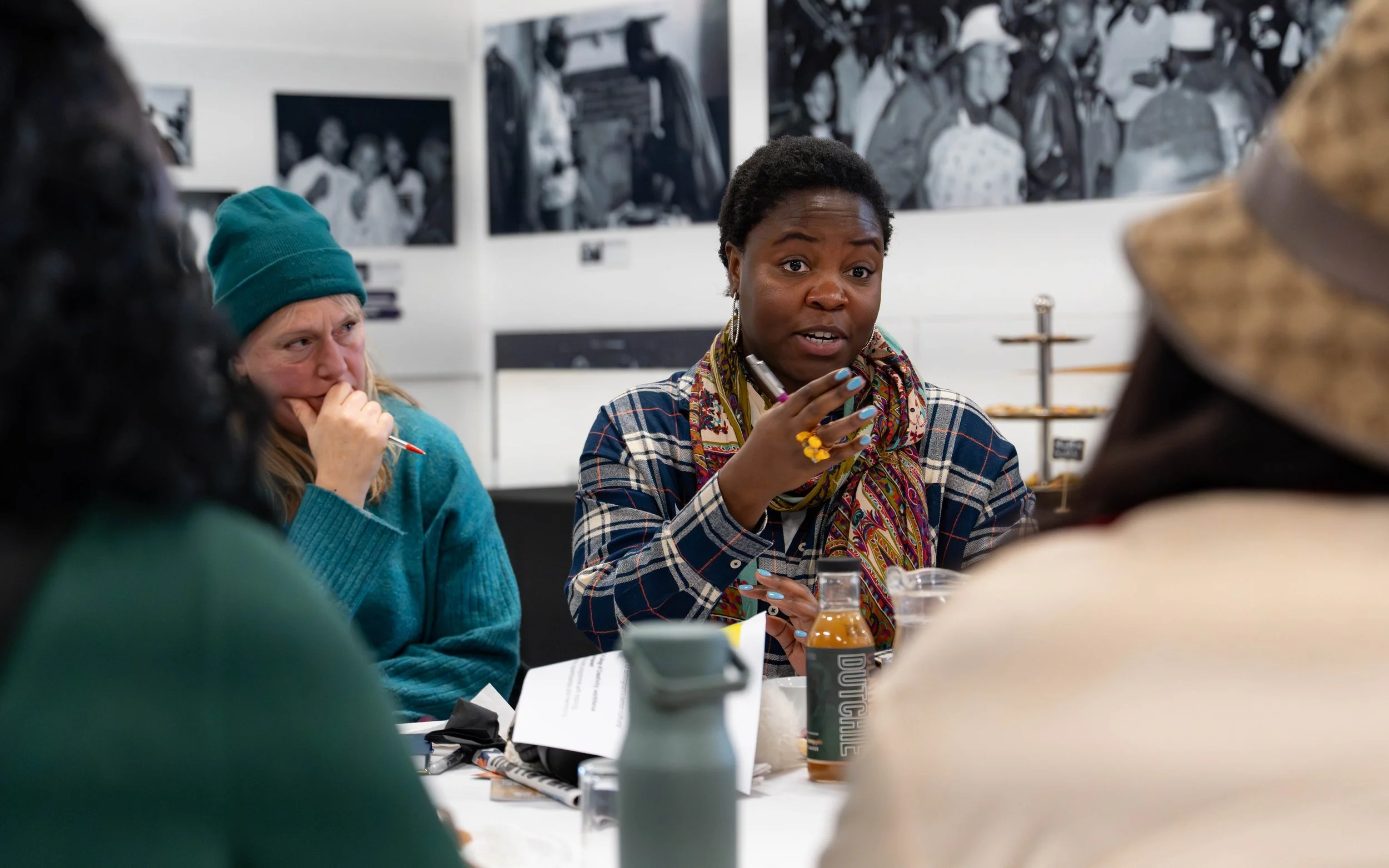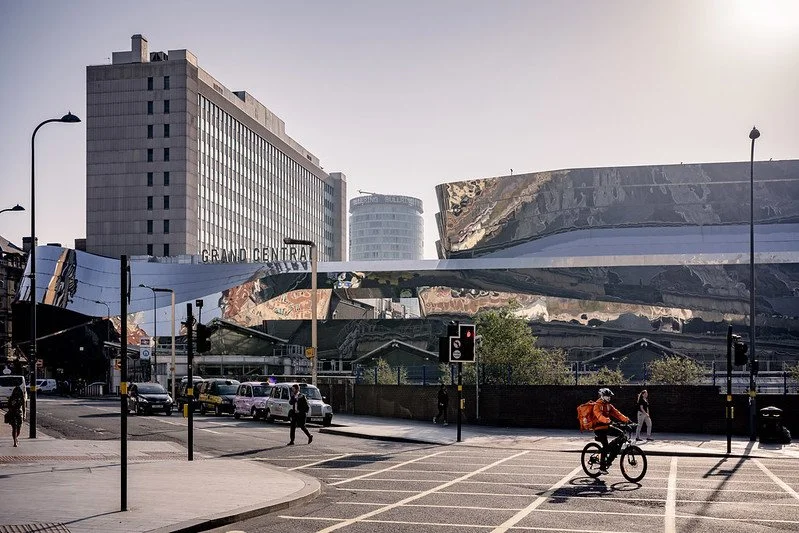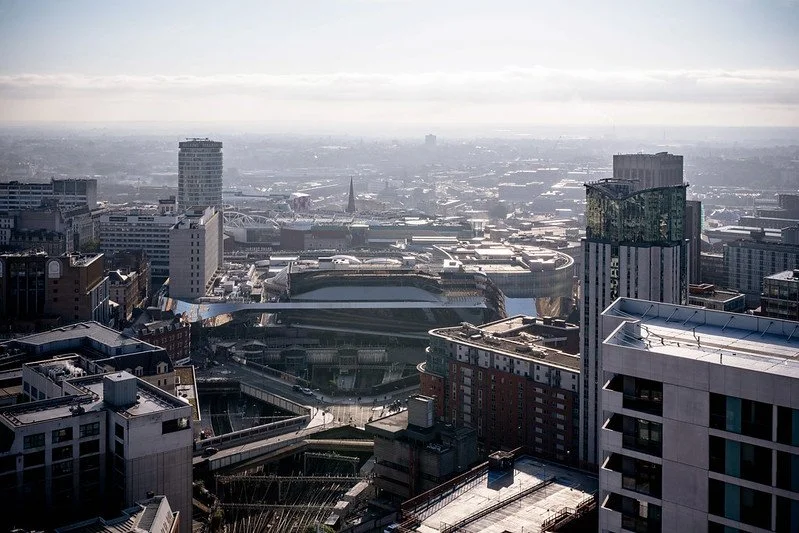Delivering for Culture
Who’s who?
This strategic framework will guide the work of Birmingham’s Cultural Compact but will clearly require the support of a wide range of partners across the city, the region and beyond. In this final section of the framework we outline key roles and responsibilities, as well as an action and outcomes framework to oversee programme delivery.
The Cultural Compact
The Compact brings together stakeholders from a range of sectors to help culture thrive and grow in the city and, in turn, increase the city’s health, wellbeing, resilience, economic prosperity and environmental sustainability. One of its first actions on being launched in 2024 was to initiate and oversee the development of Birmingham’s new Cultural Strategy 2025 – 2035, which has now emerged as this strategic framework.
The Compact will oversee this strategy, its delivery priorities and it will work with partners to meet the strategic objectives around new investment, greater inclusion, a stronger workforce and of course, how culture can play a part in placemaking. The Compact will also have a role to play in bringing the sector together, and in reporting back to the sector and to the wider people and businesses of the city, how the city is performing.
A clear early priority for the Compact will be governance and, given the overarching focus in this framework on funding and resources, a transparent and open approach to how new resources are shared across the sector and how partners and stakeholders are able to feed into and inform the Compact’s work. This last challenge could be the focus of the next phase of sector engagement.
Regional Partnerships (inc. Culture Central)
There are a number of key partners across the West Midlands who will be critical to the delivery of this framework. These would include the sector champion organisation Culture Central, the West Midlands Combined Authority and the West Midlands Growth Company, all of whom have an important part to play in delivering on culture.
Birmingham City Council
Birmingham City Council is the largest in Europe and recognizes that investing in culture brings wide-ranging economic, social, tourism and quality of life benefits to its citizens and visitors.
In September 2023 the City Council issued what is known as an S114 notice to signal that it could no longer fund culture and arts as before. The council will engage and support the Cultural Compact in the delivery of the new Birmingham Cultural Strategy, as far as its significant funding challenges allow, including:
Advocating for and unlocking further funding opportunities for culture and enabling, where possible, existing publicly funded cultural programmes to be available as match for new public & privately funded cultural initiatives. (Pillar 1)
Supporting the development of a City Cultural Attractions Pass, and potentially a Cultural Resident’s Pass, plus contributing to developing signposting of the city’s main cultural offer. (Pillar 2)
Advocating for, and potentially developing or commissioning, new cultural sector skills programmes and business support; to make it easier to enter, survive and develop a career within the creative & cultural ecosystem of the city (Pillar 3)
Supporting the further alignment of local and national planning mechanisms and funding with the cultural needs and opportunities of our diverse wards. This action potentially leading to an increase in the amount of statutory cultural investment that is embedded across the city, such as through the provision of new value for money maker and participation spaces. (Pillar 4)
Continuing the economic and social development of our local centres through the work of cultural, neighbourhood, community and business improvement teams including, e.g., developing follow-on programmes to Cultural Action Areas and bringing under-utilized heritage buildings back into use. (Pillar 4)
Supporting increased collaboration and community cohesion between Birmingham neighbourhoods leading to, e.g., cross-cultural activity such as new approaches to music and food festivals. (Pillar 5)
Advocating for Birmingham as a global cultural city and supporting work that could establish major new cultural initiatives for the city, such as a new International Cultural Festival or new National Centre for Musical Theatre. (Pillar 6)

It’s All About Impact
Actions and Outcomes framework
For each of the actions set out in the framework, we have collated a set of desired outcomes associated with that action, as well as performance indicators and a suggested programme lead. This table of actions and outcomes is of course, subject to change and it should be highlighted that there are other actions and activities set out in the framework which the Compact and partners may choose to take forward which sit outside of this table.
The big picture
Strategic read across
Birmingham’s Local Plan (Draft)
Shaping Birmingham’s Future Together
A Creative Future - Culture for Children & Young People
Our Future City: Central Birmingham Framework 2045
Heritage Strategy
Public Art Strategy
Visitor Destination Plan
WMCA Cultural Framework
HS2 arrival / go live
Curtain call
Thanks and acknowledgements
Interviews
Rachael Thomas, CEO, The Rep
Anita Bhalla, Chair, B:Music
Nick Reed, CEO, B:Music
Joanne Roney, Managing Director - Birmingham City Council
Lyle Bignon, Night Time Economy Advisor
Becky Frall, Head of Tourism, WM Growth Company
Suzie Norton, Director, Create Central
Kate Tague, Chief Exec, Birmingham Ormiston Academy
Emma Stenning, Chief Exec, CBSO - City of Birmingham Symphony Orchestra
Mohammed Ali, CEO and Artistic Director, Soul City Arts
Jon Gilchrist, Artistic Director & Chief Executive, Birmingham Hippodrome
Dr Steve Ball, Sector Rep Chair, Birmingham LGBT
Gurminder Sehint, Director, No.11 Arts
Tom Jones, Director, No.11 Arts
James Kennedy, Director, No.11 Arts
Laura Breakwell, Director, No.11 Arts
Sir David Normington, Chair, Birmingham Royal Ballet
Paul James, Chief Commercial Officer, Birmingham Royal Ballet
Rachael Thomas, CEO, Birmingham REP Theatre
Toby Norman-Wright, Senior Relationship Manager, Arts Council England
Sarah Kennedy, Senior Relationship Manager, Arts Council England
Councillor David Barker, Brandwood & Kings Heath Ward
Henriette Breukelaar, West Midlands Regional Director at the Canal and River Trust
Matt Hammond, Partner PwC. Chairman of the West Midlands Growth Company
Ian Hyde, Chief Executive Officer, Ikon Gallery
Cllr Darius Sandhu, Opposition member for Digital, Culture, Heritage & Tourism
Tom Epps, Birmingham City Council Libraries
Dawn Beaumont, Birmingham City Council Libraries
Unless otherwise stated all images courtesy of Birmingham City Council
Cultural Co-Design Event, The Exchange
Birmingham Open Studios
DESIblitz
FlatpackProjects
The GAP
KD Culture / Keneish Dance
Victoria Park Productions
Open Theatre
Helga Henry Ltd
Ikon Gallery
Birmingham Royal Ballet
Birmingham Race Impact Group
University of Birmingham
Grand Union
Midlands Arts Centre
Birmingham Contemporary Music Group
West Midlands Growth Company
The GAP Arts Project
Birmingham Hippodrome
Colmore BID / City Centre BIDs
Legacy WM
SAMPAD
B:Music / Symphony Hall and Town Hall Birmingham
Live Music Mapping Project/Aston University
Sonia Sabri Company
Queer-Side CIC
Stan's Cafe
CBSO
Annatomix
Punch / Brig
STEAMhouse
Birmingham Repertory Theatre
Stan's Cafe
Birmingham Design
The GAP Arts Project
United By 2022 Charity
Eastside Projects
David Furmage, Freshlook Creative
Workshops
Workshop, Legacy Centre
Workshop, Students from Birmingham Ormiston Academy
Workshop, Students from Birmingham City University
All Birmingham residents who completed the online ’Together on Culture’ survey
Credit: David Furnage
Compact Members (2025/26)
David Mba, Birmingham City University (Chair)
Cllr. Saima Suleman, Birmingham City Council
Emma Stenning, City of Birmingham Symphony Orchestra
Symon Easton, Birmingham City Council
Erica Love, Culture Central
James Watts, Arup
Alex Tross, Colmore Bid
Gurjit Jagpal, Head of Goldman Sachs Birmingham
Sara Jones, University of Birmingham
Tim Boyes, Birmingham Education Partnership
Brian Carr, BVSC
Mohammed Ali, Soul City Arts
Simon Delahunty Forrest, Birmingham City Council
Lyle Bignon, Night Time Economy
Nick Reed, B:Music
Hayley Pepler, WMCA
Matt Hammond, West Midlands Growth Company
Clara Day, NHS
Henriette Breukelaar, Canal and River Trust
Jon Gilchrist, Birmingham Hippodrome
Jo Tonkin, Birmingham City Council
Observers
Toby Norman-Wright / Sarah Kennedy, Arts Council England

Appendix: Co-design and engagement programme results
Online Survey – Summary
96% of respondents believe major cuts to culture and the arts in Birmingham makes the city a less attractive place to live, work and invest. Respondents see investing in culture and arts as essential for economic growth, social cohesion, and maintaining Birmingham’s identity as a diverse and creative hub.









